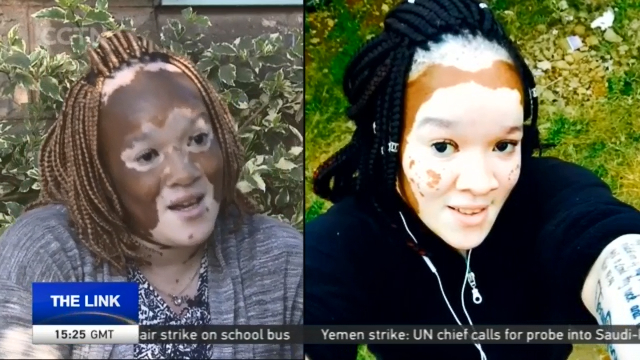
09:12, 11-Aug-2018
The Inspirers
Updated
08:51, 14-Aug-2018
03:53

Vitiligo is a rare skin condition in which the body's immune system attacks melanin cells, resulting in depigmentation. It is a hugely stigmatised and misunderstood condition in Africa, considered by many as a curse. But a young Kenyan woman with vitiligo is challenging those perceptions by raising awareness and reminding those with or without the disease that vitiligo is beautiful.
WANGUI NJEEH AMBASSADOR, VITILIGO KENYA I'm Wangui Njeeh, vitiligo ambassador Kenya. I help people living with vitiligo. I distribute to them sunscreen. I know how it feels like to be stared at, to get burnt, to go apply for jobs and not get - so I believe being an ambassador helps me encourage them. We are going to Kaluleni there's a lady who lives with 90 percent vitiligo and she had asked for sunscreen。
Vitiligo is a condition where your antibodies fight your melanin cells, so your melanin cells can not be able to produce the melanocytes - the skin colour, so you turn white. It can come at any age. It came when I was 14 and now I'm 28. When I got my first spot, my friend came and told me you have a white spot, you have chalk actually - she said you have chalk on your eye and it couldn't go so I went to the nurse and its not going. The nurse called my parents. We went to the hospital, the doctor said it's vitiligo.
At first, I was just 14 and it didn't bother me that much. But when I got to 19 and it started coming to my hands, my whole body, it really bothered me,
It's been a tough journey, to be honest. When you walk on the road, everywhere. You hear people saying snide comments like hey why you burnt, did you steal someone's husband, or such comments, were you bewitched? It's a curse, such things.
I used to feel bad because I was a model then, but now I don't. I accepted fully. For me I was beautiful and I'm still beautiful so it doesn't change anything and I accepted it.
To be honest I used to get stares. So I decided to put something that would make them stare more, I put tattoos. So when people meet me the first thing they see is tattoos they don't see vitiligo.
Some people think I'm white, some people think I'm black. We went to Israel, at that time I was fully white then I just had a patch on my face. So they told me this is the African line and this is for the whites, and they actually pulled me from the African line. They were like no you are not supposed to be here, you supposed to be on this line. And I told them no I'm from Kenya. I had to even talk Swahili. So that they understand I'm from Kenya.
I used to be a banker, I was a teller. But no one would come where I was, so it really discouraged me because I stayed there for two years and people were actually afraid of me.
Now I'm a politician. Politics makes you learn a lot, not only about people with vitiligo but the society as a whole.
I passed bills concerning the annual allocation of monies for sunscreen and protective gear for people living with vitiligo. That is one of my proudest achievements actually.
In Kenya, I believe I have already left a mark and I will do more to leave more marks and I believe in a year or two will win the Nobel prize, I believe so for this cause.

SITEMAP
Copyright © 2018 CGTN. Beijing ICP prepared NO.16065310-3
Copyright © 2018 CGTN. Beijing ICP prepared NO.16065310-3